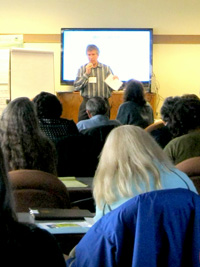
A version of this story was originally published in the Summer 2012 UW SRP eBulletin.
EPA Region 10, the Northwest Toxic Communities Coalition and the UW-SRP held a successful, collaboratively developed workshop with over 50 community participants in April this year. The outdoor air quality workshop was free to attendees and designed to provide a clearer path for community members to effectively engage with agencies on important outdoor air quality concerns. Planners had asked registrants to identify air quality topics in advance of the workshop, these included: urban corridors, CAFOs (confined animal feeding operations), coal transport, data farms, ports, pesticides and permitting of facilities. Planners recognized the importance of increasing information access to communities and that regulations intended to meet the Clean Air Act are notoriously complex. The training was developed with case study scenarios drawn from a composite of regional issues that involved a variety of regulatory authorities.
The workshop was held at Region 10 EPA offices in Seattle with remote ‘live-video’ feed to attendees in Portland, Oregon and Boise, Idaho. Air agency staff from Idaho, Oregon and Washington provided their expertise and experience from the local, regional, state and federal level. EPA regional staff from the Community Engagement and Environmental Health Unit and staff from the Agency for Toxic Substances and Disease Registry (ATSDR) also participated. ATSDR works with state and federal agencies to prevent exposure to hazardous substances. The agency conducts public health assessments and provides health trainings in communities impacted by hazardous waste. Attendees also included independent consultants and interested individuals from academic institutions. Sessions of the conference were video recorded and may be viewed here.
Workshop evaluation indicated that respondents were experienced with air quality issues and that over 80% had previously spoken to agency staff about a local air concern. More than 86% indicated they would recommend the case study approach for future workshops. The case study that described the federal government’s role scored highest for providing information participants could use in the future. In addition, feedback indicated that their participation in the workshop will inform the individual’s future actions to improve air quality. The UW-SRP and the Northwest Toxic Communities Coalition plan to seek future opportunities to collaborate with EPA on regional community workshops that follow the model established by this event.

